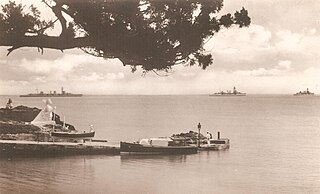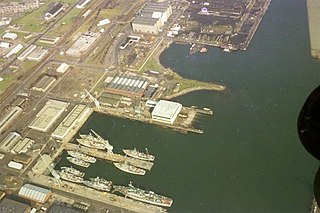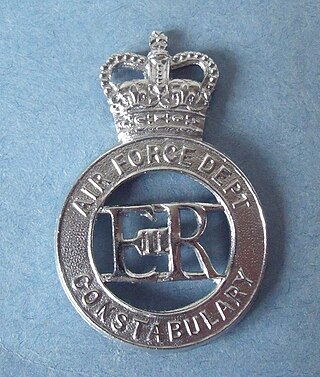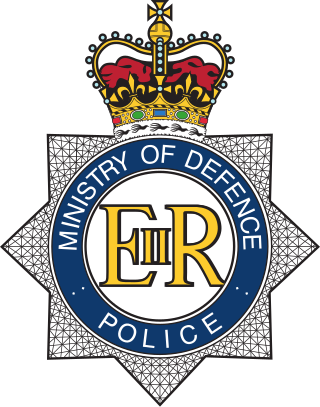
The Admiralty was a department of the Government of the United Kingdom responsible for the command of the Royal Navy until 1964, historically under its titular head, the Lord High Admiral – one of the Great Officers of State. For much of its history, from the early 18th century until its abolition, the role of the Lord High Admiral was almost invariably put "in commission" and exercised by the Lords Commissioner of the Admiralty, who sat on the governing Board of Admiralty, rather than by a single person. The Admiralty was replaced by the Admiralty Board in 1964, as part of the reforms that created the Ministry of Defence and its Navy Department.

The British Armed Forces are the military forces responsible for the defence of the United Kingdom, its Overseas Territories and the Crown Dependencies. They also promote the UK's wider interests, support international peacekeeping efforts and provide humanitarian aid.

The First Sea Lord and Chief of the Naval Staff (1SL/CNS) is a statutory position in the British Armed Forces usually held by an admiral. As the highest-ranking officer to serve in the Royal Navy, the chief is the principal military advisor on matters pertaining to the navy and a deputy to the Secretary of State for Defence. In a separate capacity, the CNS is a member of the Chiefs of Staff Committee and, thereby, a military advisor to the National Security Council, the prime minister and the monarch. The First Sea Lord is typically the highest-ranking officer on active duty of the Royal Navy unless the Chief of the Defence Staff is a naval officer. Admiral Ben Key was appointed First Sea Lord in November 2021.

The North America and West Indies Station was a formation or command of the United Kingdom's Royal Navy stationed in North American waters from 1745 to 1956, with main bases at the Imperial fortresses of Bermuda and Halifax, Nova Scotia. The North American Station absorped the separate Newfoundland Station in 1825, and the Jamaica Station in 1830, to form the North America and West Indies Station. It was briefly abolished in 1907 before being restored in 1915. It was renamed the America and West Indies Station in 1926, absorbing what had been the South East Coast of America Station and the Pacific Station. It was commanded by Commanders-in-Chief whose titles changed with the changing of the formation's name, eventually by the Commander-in-Chief, America and West Indies Station.

Royal Navy Dockyards were state-owned harbour facilities where ships of the Royal Navy were built, based, repaired and refitted. Until the mid-19th century the Royal Dockyards were the largest industrial complexes in Britain.

The Royal Navy Police (RNP) is the service police branch of the Royal Navy and Royal Marines. Members of the RNP enforce service law and discipline.

The Admiralty Board is the body established under the Defence Council of the United Kingdom for the administration of the Naval Service of the United Kingdom. It meets formally only once a year, and the day-to-day running of the Royal Navy is conducted by the Navy Board, which does not include any ministers.

The Gibraltar Defence Police (GDP) is a civil police force which provides a policing and security service for the Ministry of Defence in Gibraltar. Prior to 17 December 2009 it was known as the Gibraltar Services Police (GSP).

His Majesty's Naval Base, Portsmouth is one of three operating bases in the United Kingdom for the Royal Navy. Portsmouth Naval Base is part of the city of Portsmouth; it is located on the eastern shore of Portsmouth Harbour, north of the Solent and the Isle of Wight. For centuries it was officially known as HM Dockyard, Portsmouth: as a Royal Dockyard, Portsmouth functioned primarily as a state-owned facility for building, repairing and maintaining warships; for a time it was the largest industrial site in the world.

Rosyth Dockyard is a large naval dockyard on the Firth of Forth at Rosyth, Fife, Scotland, owned by Babcock Marine, which formerly undertook refitting of Royal Navy surface vessels and submarines. Before its privatisation in the 1990s it was formerly the Royal Naval Dockyard Rosyth. Its primary role now is the dismantling of decommissioned nuclear submarines. It is also the integration site for the Royal Navy's newest aircraft carriers, the Queen Elizabeth class as well as the Type 31 Frigate.
The admiral-superintendent was the Royal Navy officer in command of a larger Naval Dockyard. Portsmouth, Devonport and Chatham all had admiral-superintendents, as did some other dockyards in the United Kingdom and abroad at certain times. The admiral-superintendent usually held the rank of rear-admiral. His deputy was the captain of the dockyard.

The Air Force Department Constabulary was a police force in the United Kingdom, responsible for policing the airfields and aerodromes under the control of the Air Ministry, later the Air Force Department.

The Admiralty Constabulary was a police force in the United Kingdom formed under the Special Constables Act 1923. It was formed on 1 October 1949 by merging the Royal Marine Police and the Royal Marine Police Special Reserve and the Admiralty Civil Police. That Admiralty Constabulary was in turn amalgamated with the Army Department Constabulary and the Air Force Department Constabulary in 1971 to form the Ministry of Defence Police.
The Ministry of Defence Police (MDP) in the United Kingdom can trace its origins back to 1686, and has gone through a number of evolutions over the centuries to achieve its present-day form. Until late 1965, the Royal Navy, British Army and Royal Air Force were controlled by separate departments: the Board of Admiralty, the Army Board and the Air Ministry respectively, each had its own Cabinet Minister. In that year it was decided that the three services should be placed under the control of one Minister of State for Defence, and the present Ministry of Defence was formed.

The Ministry of Defence Police (MDP) is a civilian special police force which is part of the United Kingdom's Ministry of Defence. The MDP's primary responsibilities are to provide armed security and counter terrorism services to designated high-risk areas, as well as uniformed policing and limited investigative services to Ministry of Defence property, personnel, and installations throughout the United Kingdom. The MDP are not military police. Service personnel often refer to the MDP by the nickname "MOD plod".

The Glorious Revolution of 1688 rearranged the political map of Europe, and led to a series of wars with France that lasted well over a century. This was the classic age of sail; while the ships themselves evolved in only minor ways, technique and tactics were honed to a high degree, and the battles of the Napoleonic Wars entailed feats that would have been impossible for the fleets of the 17th century. Because of parliamentary opposition, James II fled the country. The landing of William III and the Glorious Revolution itself was a gigantic effort involving 100 warships and 400 transports carrying 11,000 infantry and 4,000 horses. It was not opposed by the English or Scottish fleets.

The Civil Lord of the Admiralty formally known as the Office of the Civil Lord of Admiralty also referred to as the Department of the Civil Lord of the Admiralty was a member of the Board of Admiralty who was responsible for managing the Royal Navy's supporting civilian staff, the works and buildings departments and naval lands from 1830 to 1964.

The Department of the Director of Dockyards, also known as the Dockyard Branch and later as the Dockyards and Fleet Maintenance Department, was the British Admiralty department responsible from 1872 to 1964 for civil administration of dockyards, the building of ships, the maintenance and repair of ships at dockyards and factories, and the supervision of all civil dockyard personnel.

The Admiralty Experiment Works (AEW) was the British Admiralty research establishment, responsible for improving propeller design, manoeuvrability and seakeeping in Royal Navy vessels. The Experiment Works existed from 1872 to 1977 and for most of its history was based at the Haslar Gunboat Yard in Gosport, South Hampshire. It ceased independent operations in 1977, merging with the Admiralty Marine Technology Establishment and ultimately with the Defence Research Agency in the Ministry of Defence.

The Special Constables Act 1923 was a British act of parliament passed in 1923. It made permanent an earlier act on special constables passed in 1914. Words and sections from the Act were repealed by the Police (Scotland) Act 1956 and the Police Act 1964 and – though it has not been repealed in its entirety – none of its Sections are now in effect.















